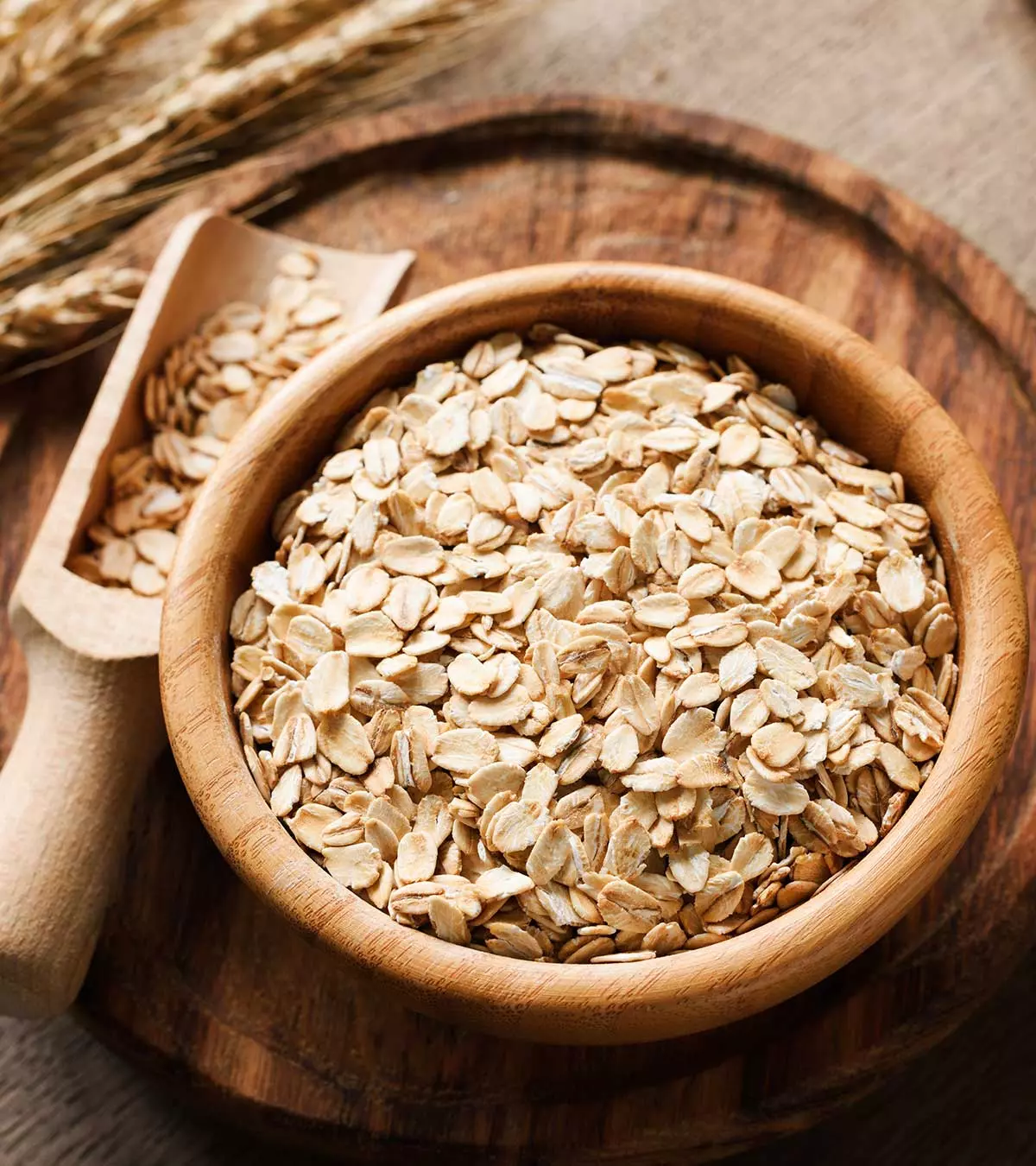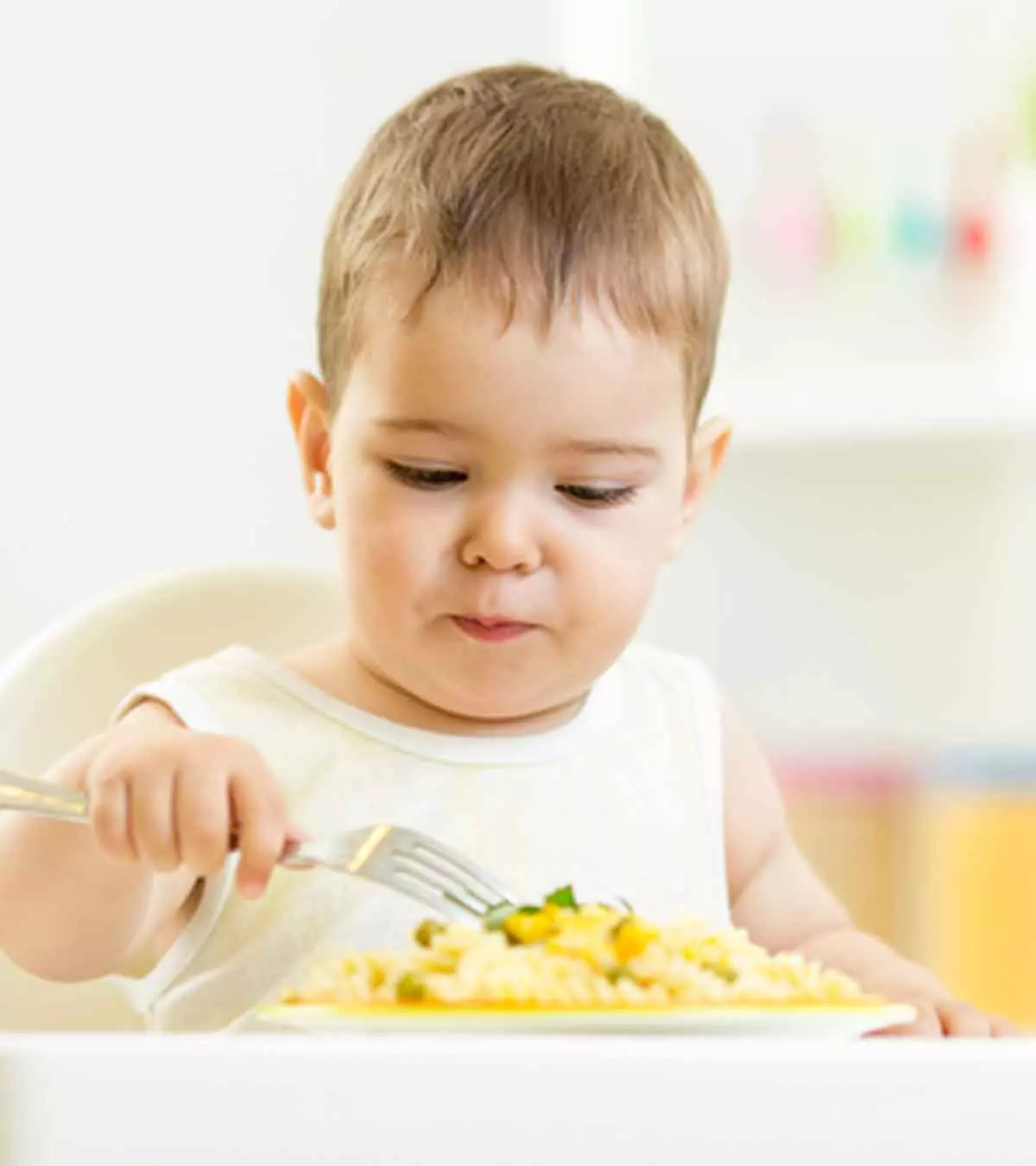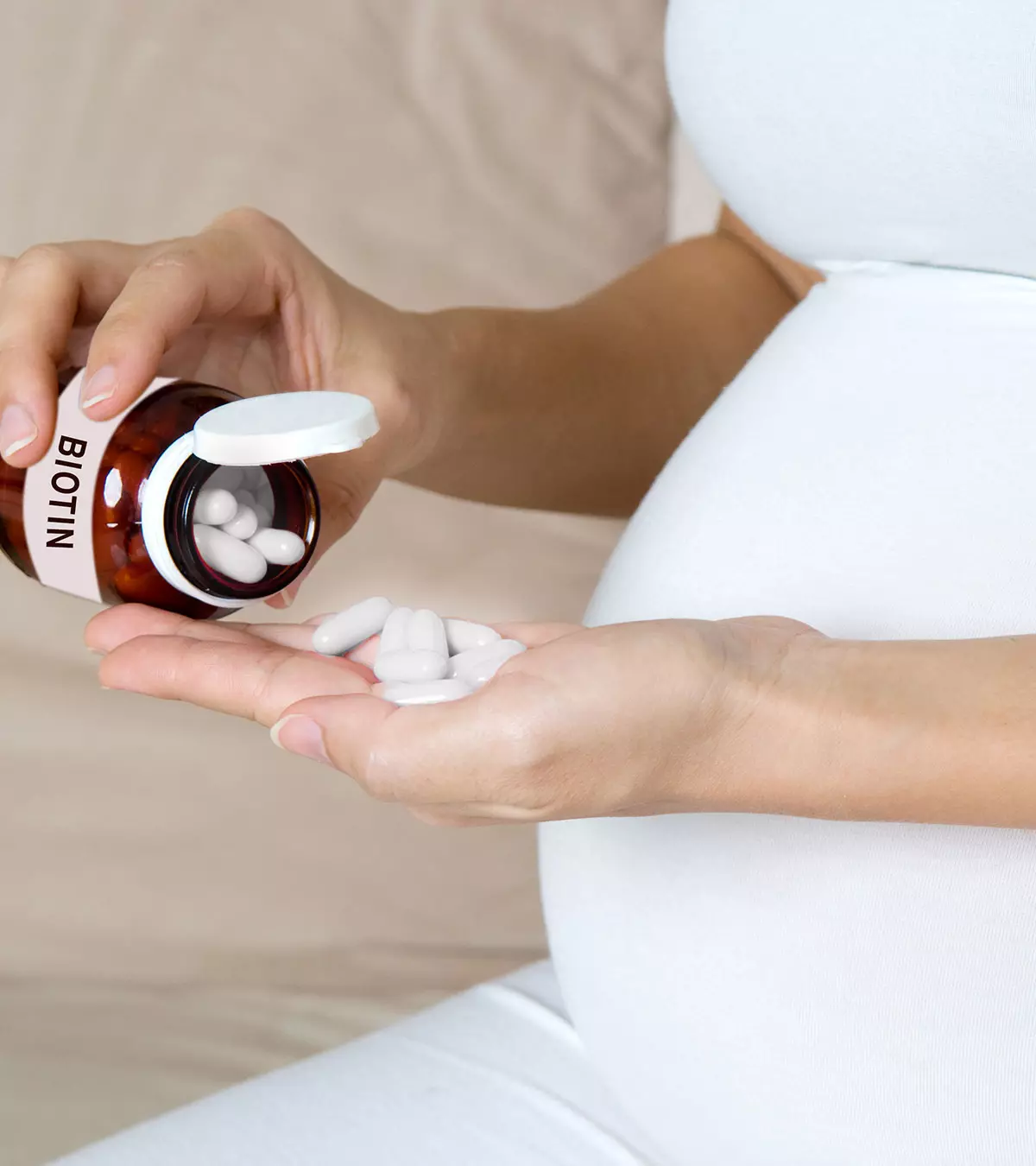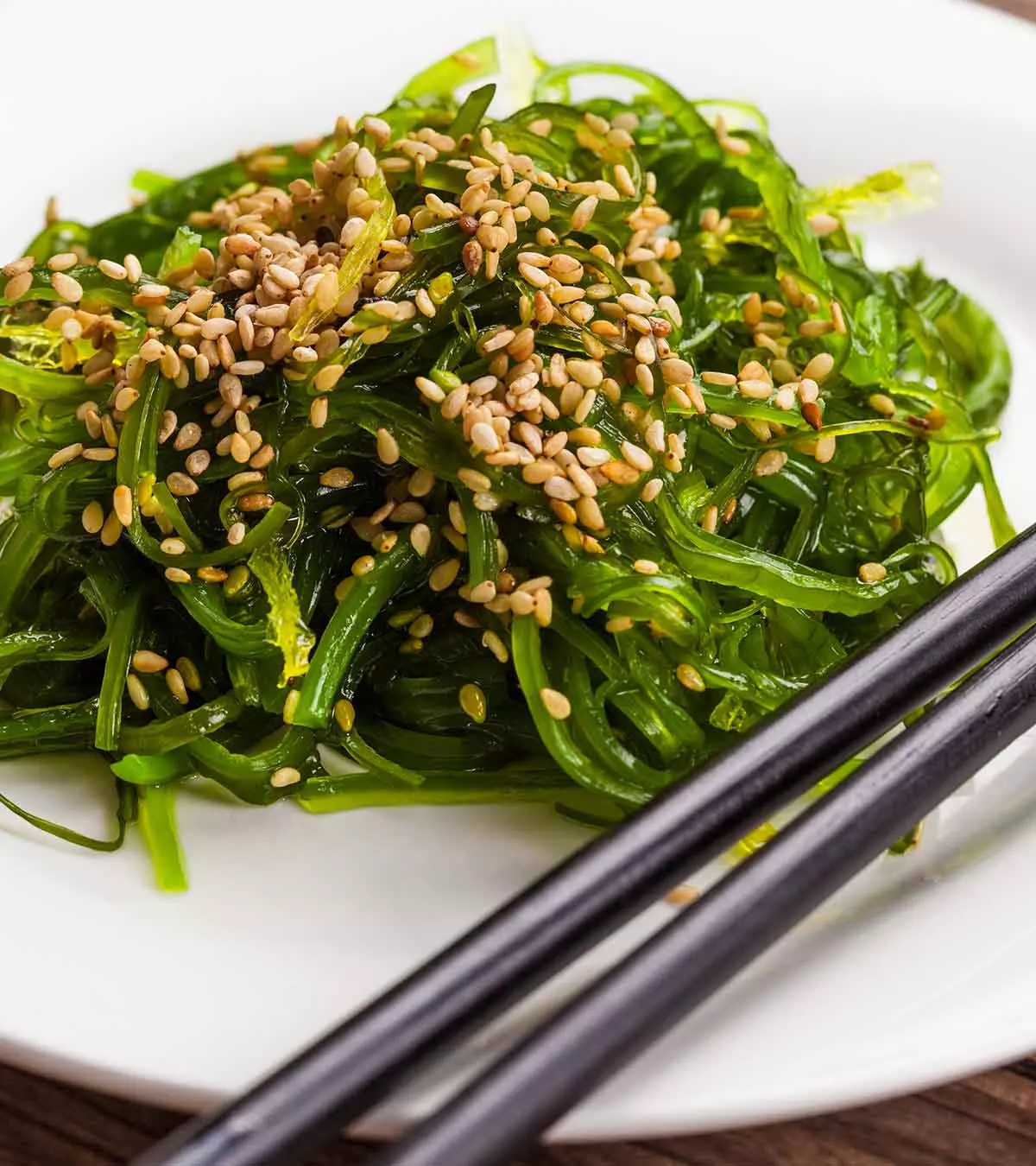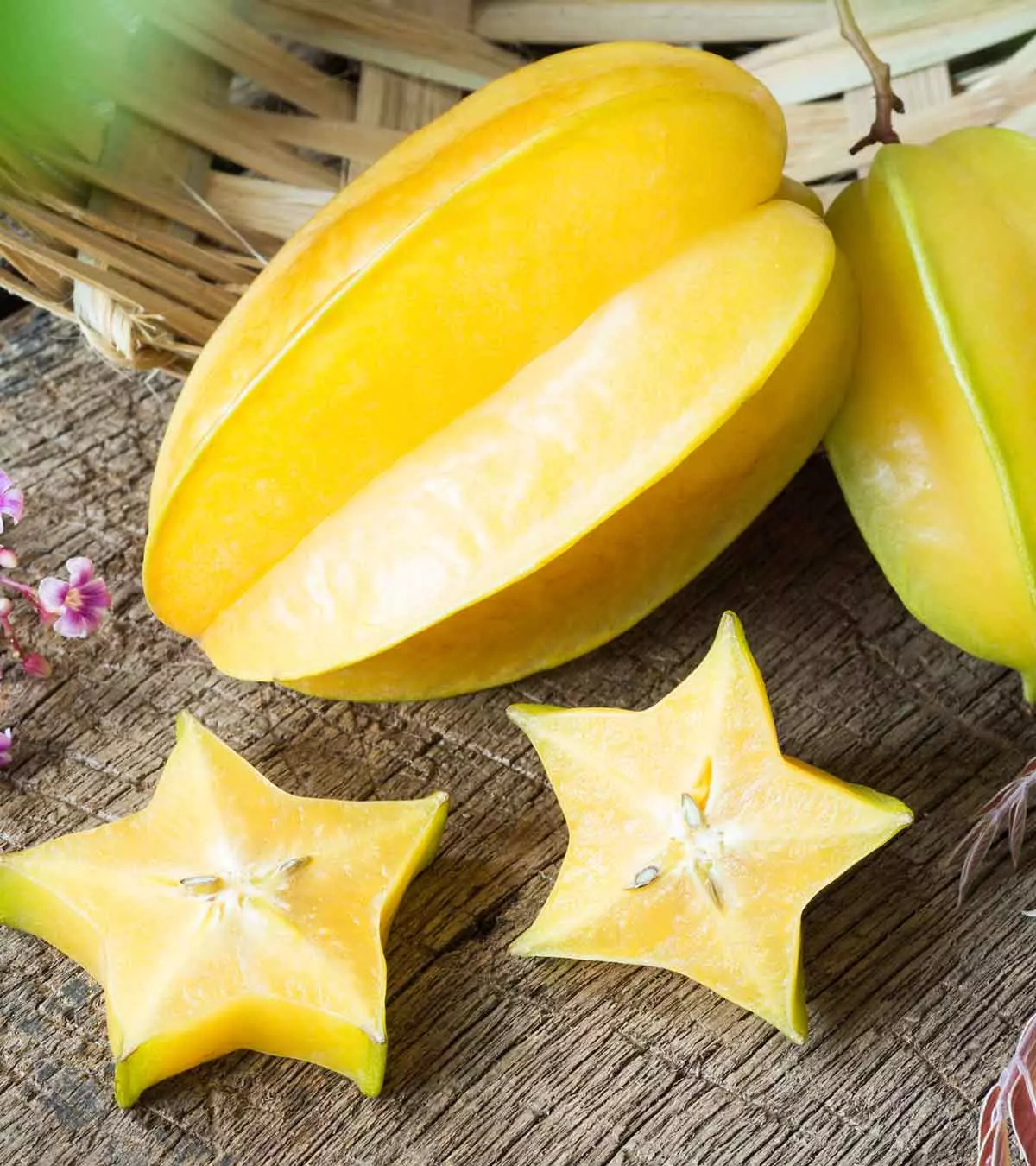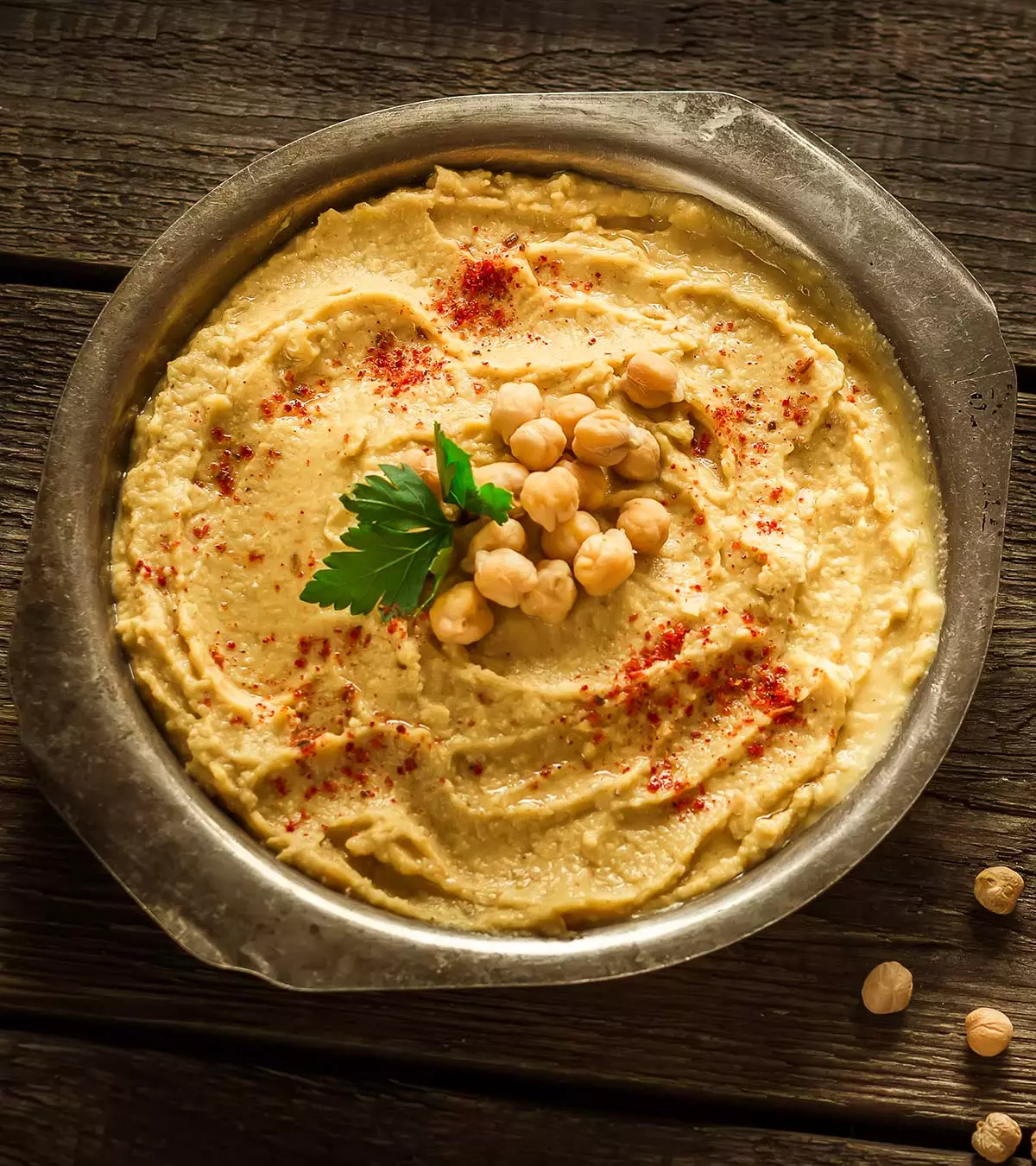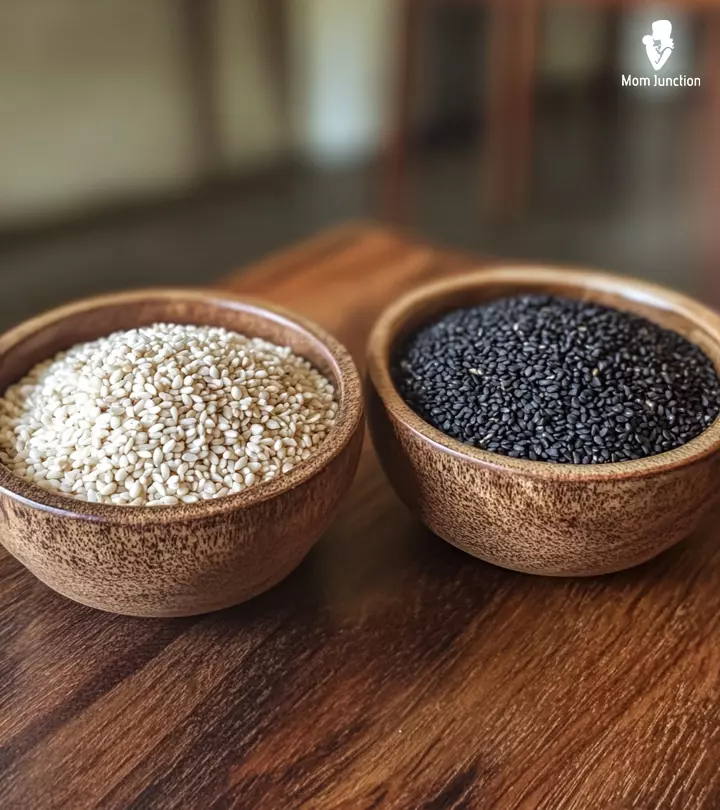
Image: Midjourney/ MomJunction Design Team
Sesame seeds, also called Sesamum indicum, are the oldest oilseed crops known to be domesticated more than 3,500 years ago. We have brought some information about the safety of sesame seeds during pregnancy to help you out. These seeds have other names like gingelly, til, benne, or bene. Sesame seeds are available in different colors such as white, yellow, black, and red.
Eating these seeds in moderation does not harm your child. On the contrary, it provides nutritional benefits such as boosting the immune system and supporting digestion. However, you should avoid eating them in excess as they may have certain side effects. So, read on to know more about its safety, health benefits, and possible side effects when eaten in excess.
Key Pointers
- Sesame seeds are rich in essential nutrients that can be beneficial during pregnancy.
- Eating sesame seeds can improve digestion and increase the mother’s energy levels, while promoting the baby’s growth.
- Despite common belief, there is no evidence that eating sesame seeds causes miscarriage.
- However, it is recommended to consult with a doctor before making any dietary changes that include sesame seeds.
Is It Safe To Eat Sesame Seeds During Pregnancy?
There is a common misconception that sesame seeds can cause miscarriage. Tara Gidus, nutrition advisor for American baby magazine in her book, ‘Pregnancy Cooking and Nutrition for Dummies,’ says that certain foods have heat that could harm the baby. She also mentions that there is no science to prove this claim, and there is no need to avoid sesame seeds. Therefore, it is better to take them in moderation during pregnancy.
Eva De Angelis, a dietitian nutritionist and health and nutrition writer from Argentina, says, “Sesame seeds are safe for pregnant women to consume in moderation unless they are allergic to them. However, excessive consumption of sesame seeds can overstimulate the uterus, increasing the risk of abortion. Plus, since the first trimester is the most vulnerable stage of pregnancy, it is best to avoid eating them during that time.”
Many pregnant women across the world eat til and til products without negative effects and there is not any scientific evidence to indicate pregnancy miscarriage.
Diana McNeil, a would-be mom, offers insights into her sesame seeds intake during pregnancy. She mentions, “I started researching sesame seeds because I craved them. Initially, I didn’t even realize my cravings as I was eating them pretty much throughout pregnancy. I used to take a spoonful of sesame seeds and sprinkle them onto my rice or vegetables. Gradually, I started to sprinkle them on everything. I started eating more of Tahini and Hummus, both made of sesame seeds. I feel that sesame seeds are a perfect food for pregnancy, and one should try to incorporate them into their diet (ⅰ).”
Sesame Seeds Nutrition And Benefits
- Calcium: According to the American College of Obstetricians and Gynecologists (ACOG), the recommended dietary allowance of calcium is 1,000mg per day for pregnant women (1). Sesame seeds contain about 989mg of calcium per 100 grams (2).
- Iron: Iron requirements double during pregnancy, and deficiency might cause anemia (3). The reference dietary intake (RDI)iA set of reference values used to plan and assess the dietary intake of healthy people is 27mg per day (4), and sesame seeds are likely to give around 14.8mg per 100 grams (1).
Apart from these, sesame is believed to have other health-promoting nutrients in reasonable amounts that you need during pregnancy.
- Sesame seeds contain calcium, folate, iron, magnesium, potassium, omega-3 fatty acids, and antioxidants. These seeds are rich in B vitamins like riboflaviniAlso known as Vitamin B-2, it is found in food and sold as a dietary supplement , niaciniOne of the water-soluble vitamins made and used by the body to derive energy from food , thiaminiA vitamin found in food and dietary supplements , and pyridoxineiA form of Vitamin B-6 vital for the production of red blood cells and the proper function of the nerves , all of which will ensure optimum fetal development.
- Contain vitamin C, which can boost a pregnant woman’s immunity.
- It is a good source of proteins and amino acids, which are necessary for the proper development of the fetus.
- Being a rich source of dietary fiber, sesame can support digestion during pregnancy.

Image: Shutterstock
- It Contains oleic acidiA fatty acid found naturally in animal and vegetable fats and oils , which keeps LDL levels low and improves HDL.
- Research suggests that sesame seeds are effective in managing high blood pressure, and also decrease the risk of preeclampsia due to their high calcium content. It may produce lower blood levels of sugar in women with gestational diabetes. These seeds contain chemicals that help reduce swelling and accelerate skin wound healing.
 Quick fact
Quick factEating sesame seeds is not harmful to pregnant women, but may arise an allergic reaction in some women. These women must avoid consuming sesame seeds.
| Nutrient | RDA (4) (5) | Per 100g of sesame seed (2) |
|---|---|---|
| Calories | 1800 – 2400 calories | 565kcal |
| Protein | 60g | 17g |
| Folate | 600μg | 98μg |
If you are interested in adding sesame seeds to your diet, we’ll tell you how you can do that.
Ways To Include Sesame Seeds In Pregnancy Diet

Image: Shutterstock
De Angelis recommends, “About one or two tablespoons of sesame seeds per day are an excellent addition to a pregnant woman’s diet.” Some of the ways that you may choose to include sesame seeds in your everyday diet are:
- Make a quick sesame dip (tahini), and eat with fresh vegetables.
- Add some sesame seeds to the basic coriander or mint chutneys for extra taste and improved nutritional value.
- Make chutney and eat with main dishes like steamed rice or quinoa.
- Roasted sesame seeds can be used as a garnish in noodles, curries, and more.
- Prepare til ladoo, chikki, or revdi (Indian sweets), which can be your power-packed dessert options.
Sesame seeds add not only nutrition but also taste to your food. But that doesn’t mean you can have them beyond a limit.
 Point to consider
Point to considerSide-effects Of Consuming Excessive Sesame Seeds During Pregnancy

Image: Shutterstock
There might be a few risks associated with sesame seeds:
- Do not eat them in excess during the first trimester when your pregnancy is still delicate. If you happen to see any spotting after eating sesame seeds, check with your doctor.
- Avoid them if you have a history of allergies to seeds since seeds, including sesame, are among the common food allergens known in the US (6).
 Caution
CautionIt is still advisable to check with your doctor before consuming them. Remember, moderation is always the key.
Frequently Asked Questions
1. Are black sesame seeds healthier than white sesame seeds?
Both black and white sesame seeds have the same composition, and differences only lie in taste and smell. Black seeds retain their hull, while white seeds have their hull removed. There is no science saying one is healthier than the other.
2. Is it safe to consume sesame oil (gingelly oil) during pregnancy?
Sesame seeds could be a good option, much like olive oil or canola oil, that may help meet your requirement of healthy fats. These fats might absorb fat-soluble vitamins and minerals that may be important for you and your baby’s health. However, it’s crucial to ensure that the oil is from a reputable source and is consumed in moderation to avoid excessive caloric intake.
3. Can sesame seeds help with pregnancy-related constipation?
Sesame seeds are a good source of dietary fiber, which can aid in relieving constipation during pregnancy (2).
4. Can sesame seeds help with cholesterol levels during pregnancy?
A study suggested that sesame seed supplementation may decrease blood cholesterol levels, accelerate lipid metabolism, and increase antioxidant status in patients with elevated cholesterol levels (10). This effect may be seen in pregnant women.
5. Can sesame seeds cause premature labor?
There is no scientific evidence that shows consuming sesame seeds can cause premature labor.
Sesame seeds are nutrient-rich foods that contain essential nutrients, such as calcium, iron, folic acid, and magnesium. Consuming sesame seeds during pregnancy as a part of a healthy, well-balanced diet can benefit you and your unborn baby’s overall health. You can add sesame seeds to salads, homemade energy bars, or curries to enhance the meal’s nutritional value. However, keep their overall intake in moderation to avoid the side effects of excessive consumption. Cold-pressed sesame seeds oil is another way to include sesame seeds in your pregnancy diet.
Infographic: Ways To Include Sesame Seeds In Pregnancy Diet
Sesame seeds can help your pregnancy when you know how to eat them right. So to help you eat these in moderation and extract their goodness, we present a few tips for using sesame seeds to enhance the nutritional value of your pregnancy diet. Take a printout and stick it to your kitchen wall! Illustration: Momjunction Design Team
Illustration: Does Sesame Seeds (Til) During Pregnancy Cause Miscarriage?
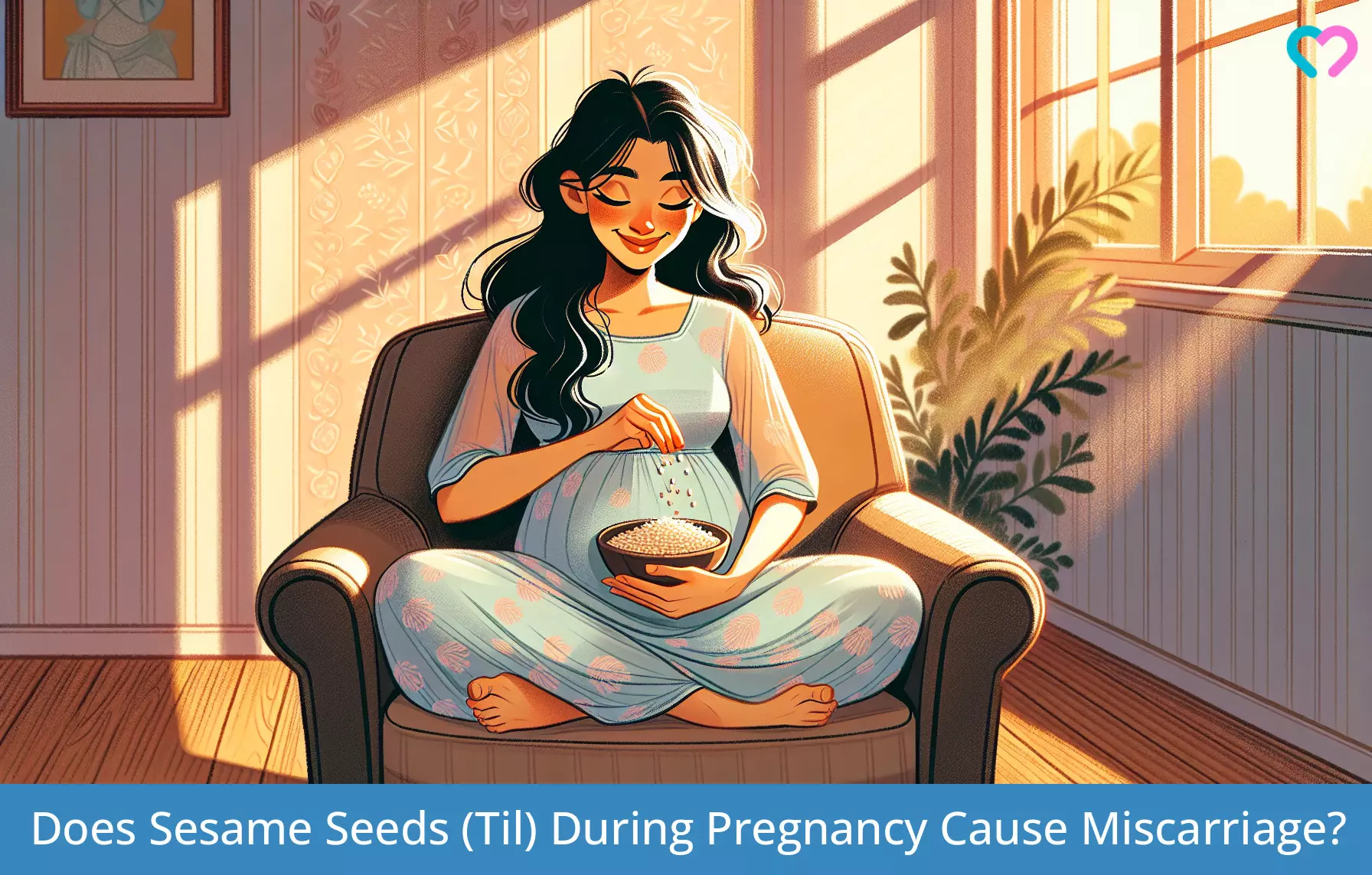
Image: Dall·E/MomJunction Design Team
Personal Experience: Source
MomJunction articles include first-hand experiences to provide you with better insights through real-life narratives. Here are the sources of personal accounts referenced in this article.
(ⅰ) Sesame Seeds for Healthy Pregnancy and Breastfeeding;https://www.youtube.com/watch?v=1Q-XKIKPtiU
References
1. Pregnancy: Nutrition; Cleveland Clinic
2. Seeds, sesame seeds, whole, roasted and toasted (170151); Basic report; USDA
3. Eat Smart to Prevent Iron Deficiency; Family Health Service; The Government of the Hong Kong Special Administrative Region (2019)
4. Michelle A. Kominiarek and Priya Rajan; Nutrition Recommendations in Pregnancy and Lactation; Med Clin North Am (2017)
5. Eating right during pregnancy; U.S. National Library of Medicine
6. Food Allergy; American College of Allergy, Asthma & Immunology
7. Ragini Sharma et al; Sesamum Indicum Before And During Pregnancy: A Review; International Journal of Research and Development in Pharmacy and Life Sciences; Omics (2015)
8. Sesame Profile Allergy; Agricultural Marketing Resource Center
9. Ghosh Debosree and Ghosh Suvendu;Forbidden Foods for Healthy Pregnancy; International Journal of Scientific Research and Reviews (2018)
10. Beitollah Alipoor et al.; Effect of sesame seed on lipid profile and redox status in hyperlipidemic patients; National Library of Medicine (2012)
Community Experiences
Join the conversation and become a part of our nurturing community! Share your stories, experiences, and insights to connect with fellow parents.
Read full bio of Dr. Irene (Eirini) Orfanoudaki
- Eva De Angelis is a dietitian nutritionist and chef from Argentina. She holds a BS in Human Nutrition and Dietetics from Universidad ISalud and is in private practice.
 Eva De Angelis is a dietitian nutritionist and chef from Argentina. She holds a BS in Human Nutrition and Dietetics from Universidad ISalud and is in private practice.
Eva De Angelis is a dietitian nutritionist and chef from Argentina. She holds a BS in Human Nutrition and Dietetics from Universidad ISalud and is in private practice.
Read full bio of Swati Patwal
Read full bio of Rebecca Malachi
Read full bio of Aneesha Amonz










